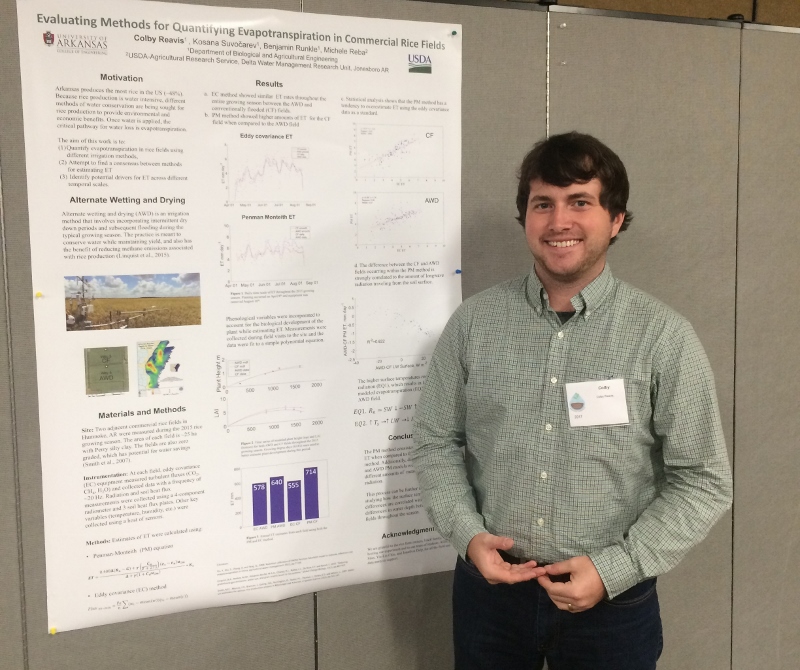Biological Engineering Graduate Student Helps Rice Farmers Save Water
Colby Reavis, a master's student in the Department of Biological and Agricultural Engineering, works with local farmers to improve rice growing techniques. As part of the Landscape Flux Research Group, led by assistant professor Benjamin Runkle, Reavis investigates ways to reduce the amount of water used and greenhouse gas produced in growing rice. He recently received first place in a poster competition at the Arkansas Soil and Water Education Conference for his research.
The group is studying a technique called alternate wetting and drying. Rice requires swampy conditions to grow, but farmers who use alternate wetting and drying allow their fields to dry out during certain parts of the season. This approach uses less water and reduces methane gas, which is produced by anaerobic bacteria that thrive in wet conditions.
Reavis is studying different ways to measure the amount of water that alternate wetting and drying saves. It's difficult to get an exact measurement of how much water a rice field actually receives, because some of the water drains off into other fields, so Reavis measures water on the other end of the cycle, as it's released into the atmosphere from the plants, a process called evapotranspiration. He is comparing different techniques to measure evapotranspiration, so that the group can incorporate it into their work with local farmers.
Reavis explained that quantifying water savings is important for farmers who are considering adopting this method. "Farmers need to be able to show how much water they save," Reavis said. "At the end of the day, does this conserve water? If not, they don't save any money."
Rice is an important crop, both globally and regionally. Rice provides one-fifth of the world's calories, and Arkansas produces half of the rice grown in the U.S. The Landscape Flux Group work closely with local rice farmers in order to ensure that the results of their work will be useful in the industry. "Farmers are a huge part of what we do," Reavis said, explaining that all of the fieldwork in the project is carried out in two commercial fields provided by a local farming family. Having these experts involved provides a valuable perspective for the researchers, who may not be familiar with the day to day aspects of running a farm. "Oftentimes, we as researchers ask questions without thinking about further applications. Working with farmers provides that. They're a great source of information about the process we're studying, as well as the historical and cultural context," Reavis said.
Over the winter break, Reavis traveled to South Korea with a grant from the Asia Rice Foundation. In South Korea, he worked with Youngryel Ryu, an associate professor of environmental ecology at Seoul National University. Reavis learned about Ryu's Breathing Earth System Simulator, known as BESS. BESS collects scientific data using tools such as satellites, sensors and geographic information system data in order to measure the amounts of water and carbon on earth and simulate their movements. Monitoring data from rice fields is a large part of this project.
The trip to South Korea also provided Reavis with a different perspective on rice. "I appreciated seeing how much of a role rice has in Korean culture," he said. "It plays a valuable role for us as researchers to see the impact of our work on people's lives."
Reavis has also worked in Ethiopia and he participated in an international service project in Belize as an undergraduate at the U of A. He explains that he chose to continue his studies under Runkle because the research topics he studies are globally relevant, and he enjoys using science to improve people's lives. After graduating, Reavis would like to continue being involved in research and public outreach while continuing to pursue a doctorate.
Topics
Contacts
Camilla Shumaker, director of communications
College of Engineering
479-575-5697,
camillas@uark.edu
Headlines
PetSmart CEO J.K. Symancyk to Speak at Walton College Commencement
J.K. Symancyk is an alumnus of the Sam M. Walton College of Business and serves on the Dean’s Executive Advisory Board.
Faulkner Center, Arkansas PBS Partner to Screen Documentary 'Gospel'
The Faulkner Performing Arts Center will host a screening of Gospel, a documentary exploring the origin of Black spirituality through sermon and song, in partnership with Arkansas PBS at 7:30 p.m. Thursday, May 2.
UAPD Officers Mills and Edwards Honored With New Roles
Veterans of the U of A Police Department, Matt Mills has been promoted to assistant chief, and Crandall Edwards has been promoted to administrative captain.
Community Design Center's Greenway Urbanism Project Wins LIV Hospitality Design Award
"Greenway Urbanism" is one of six urban strategies proposed under the Framework Plan for Cherokee Village, a project that received funding through an Our Town grant from the National Endowment for the Arts.
Spring Bike Drive Refurbishes Old Bikes for New Students
All donated bikes will be given to Pedal It Forward, a local nonprofit that will refurbish your bike and return it to the U of A campus to be gifted to a student in need. Hundreds of students have already benefited.





